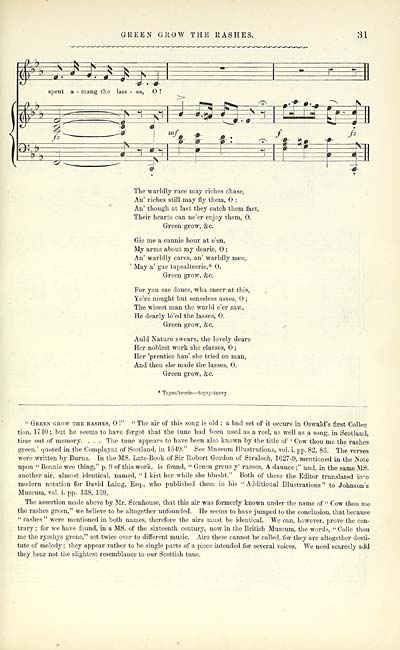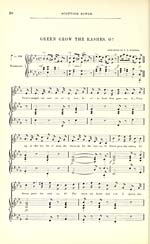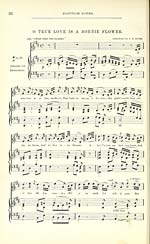Glen Collection of printed music > Printed music > Songs of Scotland > Volume 1
(45) Page 31
Download files
Complete book:
Individual page:
Thumbnail gallery: Grid view | List view

GREEN GROW THE RASHES.
31
The warldly race may riches chase,
An' riches still may fly them, ;
An' though at last they catch them fast,
Their hearts can ne'er enjoy them, 0.
Green grow, &c.
Gie me a cannie hour at e'en,
My arms about my dearie, ;
An' warldly cares, an' warldly men,
' May a' gae tapsalteerie,* 0.
Green grow, &c.
For you sae douce, wha sneer at this,
Ye're nought but senseless asses, ;
The wisest man the warld e'er saw,
He dearly lo'ed the lasses, 0.
Green grow, &e.
Auld Nature swears, the lovely dears
Her noblest work she classes, ;
Her 'prentice han' she tried on man,
And then she made the lasses, 0.
Green grow, &c.
* Tapsalteerie — topsy-turvy.
" Green grow the rashes, !" " The air of this song is old ; a bad set of it occurs in Oswald's first Collec
tion, 17-10 ; but he seems to have forgot that the tune had been used as a reel, as well as a song, in Scotland,
time out of memory. . . . The tune appears to have been also known by the title of ' Cow thou me the rashes
green,' quoted in the Complaynt of Scotland, in 1549." See Museum Illustrations, vol. i. pp. 82, 83. The verses
were written by Burns. In the MS. Lute-Book of Sir Robert Gordon of Straloch, 1627-9, mentioned in the Note
upon " Bonnie wee thing," p. 9 of this work, is found, " Green greus y' rasses, A daunce ;" and, in the same MS.
another air, almost identical, named, " I kist her while she blusht." Both of these the Editor translated hro
modern notation for David Laing, Esq., who published them in his "Additional Illustrations" to Johnson's
Museum, vol. i. pp. 138, 139.
The assertion made above by Mr. Stenhouse, that this air was formerly known under the name of " Cow thou me
the rashes green," we believe to be altogether unfounded. He seems to have jumped to the conclusion, that because
" rashes " were mentioned in both names, therefore the airs must be identical. We can, however, prove the con-
trary ; for we have found, in a MS. of the sixteenth century, now in the British Museum, the words, " Colle thou
me the rysshys grene," set twice over to different music. Airs these cannot be called, for they are altogether desti-
tute of melody ; they appear rather to be single parts of a piece intended for several voices. We need scarcely add
they bear not the slightest resemblance to our Scottish tune.
31
The warldly race may riches chase,
An' riches still may fly them, ;
An' though at last they catch them fast,
Their hearts can ne'er enjoy them, 0.
Green grow, &c.
Gie me a cannie hour at e'en,
My arms about my dearie, ;
An' warldly cares, an' warldly men,
' May a' gae tapsalteerie,* 0.
Green grow, &c.
For you sae douce, wha sneer at this,
Ye're nought but senseless asses, ;
The wisest man the warld e'er saw,
He dearly lo'ed the lasses, 0.
Green grow, &e.
Auld Nature swears, the lovely dears
Her noblest work she classes, ;
Her 'prentice han' she tried on man,
And then she made the lasses, 0.
Green grow, &c.
* Tapsalteerie — topsy-turvy.
" Green grow the rashes, !" " The air of this song is old ; a bad set of it occurs in Oswald's first Collec
tion, 17-10 ; but he seems to have forgot that the tune had been used as a reel, as well as a song, in Scotland,
time out of memory. . . . The tune appears to have been also known by the title of ' Cow thou me the rashes
green,' quoted in the Complaynt of Scotland, in 1549." See Museum Illustrations, vol. i. pp. 82, 83. The verses
were written by Burns. In the MS. Lute-Book of Sir Robert Gordon of Straloch, 1627-9, mentioned in the Note
upon " Bonnie wee thing," p. 9 of this work, is found, " Green greus y' rasses, A daunce ;" and, in the same MS.
another air, almost identical, named, " I kist her while she blusht." Both of these the Editor translated hro
modern notation for David Laing, Esq., who published them in his "Additional Illustrations" to Johnson's
Museum, vol. i. pp. 138, 139.
The assertion made above by Mr. Stenhouse, that this air was formerly known under the name of " Cow thou me
the rashes green," we believe to be altogether unfounded. He seems to have jumped to the conclusion, that because
" rashes " were mentioned in both names, therefore the airs must be identical. We can, however, prove the con-
trary ; for we have found, in a MS. of the sixteenth century, now in the British Museum, the words, " Colle thou
me the rysshys grene," set twice over to different music. Airs these cannot be called, for they are altogether desti-
tute of melody ; they appear rather to be single parts of a piece intended for several voices. We need scarcely add
they bear not the slightest resemblance to our Scottish tune.
Set display mode to: Large image | Transcription
Images and transcriptions on this page, including medium image downloads, may be used under the Creative Commons Attribution 4.0 International Licence unless otherwise stated. ![]()
| Special collections of printed music > Glen Collection of printed music > Printed music > Songs of Scotland > Volume 1 > (45) Page 31 |
|---|
| Permanent URL | https://digital.nls.uk/90412142 |
|---|
| Shelfmark | Glen.214 |
|---|---|
| Additional NLS resources: | |
| Attribution and copyright: |
|
| Description | Scottish songs and music of the 18th and early 19th centuries, including music for the Highland bagpipe. These are selected items from the collection of John Glen (1833 to 1904). Also includes a few manuscripts, some treatises, and other books on the subject. |
|---|
| Description | The Glen Collection and the Inglis Collection represent mainly 18th and 19th century Scottish music, including Scottish songs. The collections of Berlioz and Verdi collected by bibliographer Cecil Hopkinson contain contemporary and later editions of the works of the two composers Berlioz and Verdi. |
|---|

